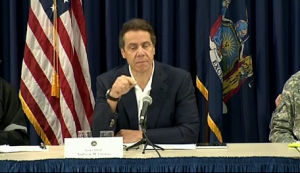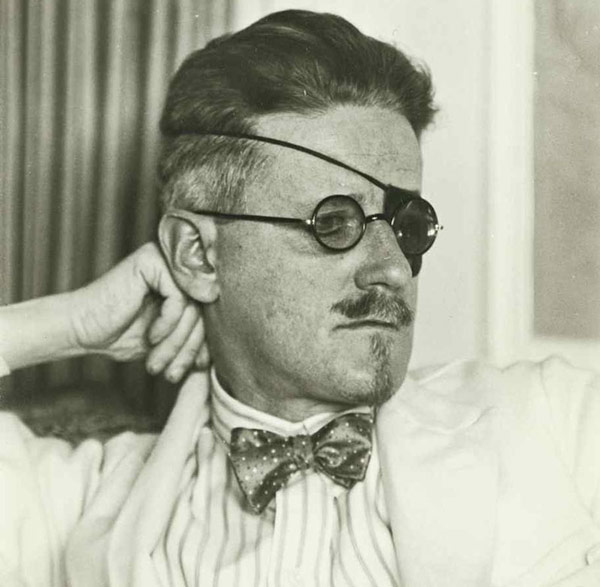Writing Game #1: “25, Strange as You Can”
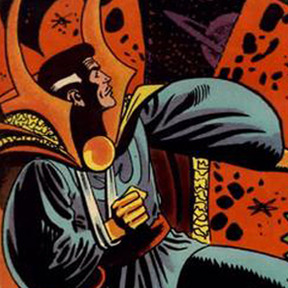 I like making up writing games.
I like making up writing games.
Let’s start with a simple one: Write the strangest, grammatically correct 25-word-long sentence that you can.
If you want an additional challenge or jumping-off point, you can specify that one or more words must be included.
Using this random word generator, I came up with the word “abbeys.” So let’s try writing a few strange 25-word-long sentences with that word:
On Immersion

I’M IN THIS screen. So who cares that’s easy. The average American spends more than half their waking hours looking at one of these. That’s the word, anyways. And so you figure our neurological roads lean hard toward our being mostly screen. Dude McLuhan said something about how the advent of television, in contrast to the film projector, threw light upon rather than in front of us and made us screens that way as well. Something about how this left a gap in which the act of viewing became participatory, created an organic circuit.
So I’m in this screen and I AM this screen. I’m also positioned in front of or outside the screen. That’s already a trianglejob, without even considering the other very hard.
Every mage of the ages melted down and flattened all their shewing stones and crystal balls to make the LCD we’re gazing hard and scrying in. Whether the display is a window, a mirror, or a screen proper, or if the difference between those is even worth speculating on, it doesn’t change our being here, suspended outside time and space in a locus we’ve taken mostly for granted. What a bunch of witchy fucking cyborgs we’ve become. I’m either psyched on or repulsed by that depending on the mood.
What the shit is nature..? If we’ve developed these powers of sight and being as we have because they were inevitable then there’s no hard line. READ MORE >
<:-O___>:-0___\:-/_____ “Can anything be poetic? Well maybe the same way nearly anything can be spray-painted.”
In defense of romance novels
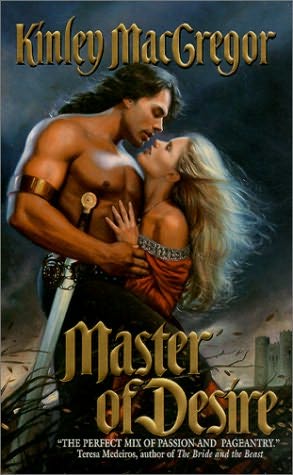 Piggybacking on Mike’s earlier post, I have long found it curious that the romance novel is the one genre no one wants to defend. (See, for instance, this comment.) But time was, romance was the genre.
Piggybacking on Mike’s earlier post, I have long found it curious that the romance novel is the one genre no one wants to defend. (See, for instance, this comment.) But time was, romance was the genre.
It seems to me that the contemporary romance novel—of the paperback bodice ripper variety (see right)—arrived on our shores of our literary imagination in no small part due to writers like D. H. Lawrence. And what could be more literary than Lawrence? I myself can conceive of no formal reason why a romance novel can’t be art. Indeed, I suspect that someone out there is already writing great ones. (Hell, isn’t Lolita a romance novel?)
Part of what I love about this Chicago Reader review of The Twilight Saga: Eclipse is its understanding of how Stephanie Meyers’s books and the resulting films—regardless of their quality (I haven’t read or seen them yet, though I intend to)—do partake of a larger literary tradition:
A Summary of Our Academic Conference, The Unstable and [de] Mutable Boundaries Between Meteorological Atrocities and Human Political Economies with Bodies-as-Subjects Coming Into Being As They Are
The approach of Hurricane Sandy has already altered the entire course of me and my friend’s lives. On Sunday, I was supposed to shop for vintage sweaters and attend a poetry brothel. These would’ve probably been some wonderful moments. But Hurricane Sandy put a stop to all my hypothetically marvelous adventures.
Instead my friends and I were bunkered in our apartment in Alphabet City.
What were we to do?
If we were VIDA, then we could count the number of times a masculine pronoun appeared in this week’s NYT Book Review and then compare it to the number of times that a feminine pronoun appeared in this week’s NYT Book Review and then get really angry about it and channel all of our anger into a neat and tidy chart.
If we were overly anxious New York Jews then we could close down the subway system at 7 PM, hold press conferences using folksy idioms like “up and about,” and dress like men who spend a great deal of time in well-off subdivisions of Connecticut.
Also, if we were male homosexuals, we could have sex nonstop sans condoms.
But my friends and I aren’t any of those things. So, in lieu of that, we chose to hold an academic conference that had an awful lot of relevance to our current predicament. Our conference, which was held last night (28 Oct. 2012), was called The Unstable and [de] Mutable Boundaries Between Meteorological Atrocities and Human Political Economies with Bodies-as-Subjects Coming Into Being As They Are. This conference has already been compared to some of the most vivid and vivacious academic conferences ever held.
Here’s a summary:
October 29th, 2012 / 12:27 pm
Krazy Kat: Herriman, Cantor, von Heyl
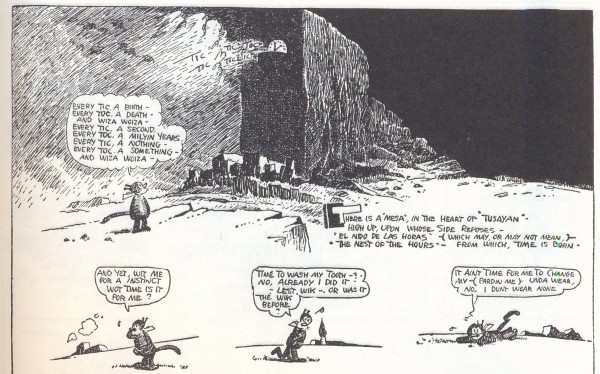
from Krazy Kat, 1913-1944 by George Herriman
The sun on her carpet was swirling up into a fire of magnesium blues and sulfurous browns, a mushroom cloud of flame and smoke, with little Ignatz and his metal necktie rising serenely on top. Top o’ the World, Ma! Once more she was watching a fire storm that she had somehow caused, and it was shaking her apart! She felt like she had a snake coiling inside her, yet the snake was her, and she was inside it. The snake was made of blackness and stars. And every star in the snake was another smaller snake that was made of blackness and stars, and those stars were snakes made of blackness and stars. The snake was the beginning and end of things: death biting the tail of love, every yes that became no that became love become hate become yes again. The snake would kill her but it would give birth to her, too, over and over, if only she could keep the snake together. And the only way to do that was to get the tail of it into her own mouth, to bite the beginning and end of things and be the circle.
from Krazy Kat: a novel in five panels, 1988, by Jay Cantor
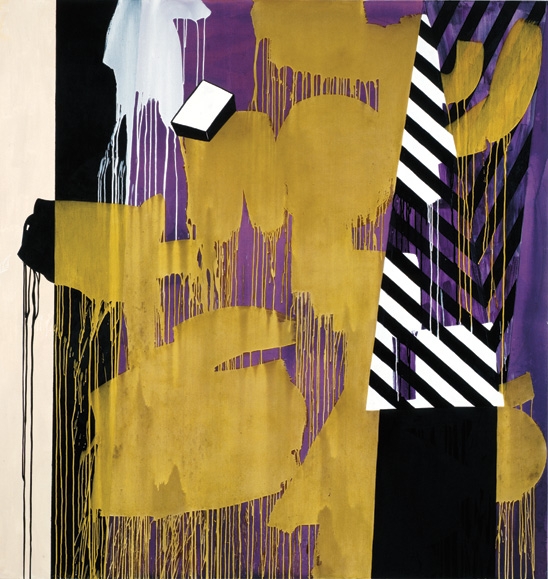
It’s Vot’s Behind Me That I Am (Krazy Kat), 2010, acrylic and oil on linen and canvas, by Charline von Heyl
How NOT to Put Together a Short Story Collection
I have this short story collection called May We Shed These Human Bodies that just came out from Curbside Splendor, and I think probably the thing people ask most often about it is “how do you put together a short story collection?” And honestly, I have no fucking clue. But I can tell you that this version of the collection, the version that Curbside Splendor picked up, is probably the tenth version of this collection. It has had other names, other stories, other orders and versions, has been longer or shorter, and at one point in its long history of rejection sat in my laptop’s trash for four months. It has been rejected or ignored by nine publishers in its various forms. So what I can tell you, judging by my own experience only, is how NOT to put together a short story collection – at least, if you want it to be published.
DO NOT say to yourself, Well, I’ve got a lot of stories now, so I guess it’s time to shove them all into a manuscript and send it around. This is not a good reason to compile a short story collection. Are your stories good? Do they complement each other in some way? Do they reflect the very best of your writing? Then by all means, go to it. But be aware: selling a short story collection is very difficult. Editors like novels. Some presses only publish novels. This doesn’t meant that you won’t be able to sell your collection but do not think that this will be an easy task. As a short story writer, you already have an uphill battle to fight. If you’re working on a novel, or have a fantastic idea for a novel, it might be better to just do that instead. If, like me, you are deep-in-your-soul a short story writer, then I am sorry for you and glad for you. Just be prepared for a long slog.
DO NOT treat your story collection like a mix tape. Please dear god no stop do not do this. I followed this advice, or tried to follow it, because I heard it over and over again. I think writers repeat it because they want their book to be as cool as an album. Look. Stories are not songs. Trying to figure out how to make your book like a mix tape will drive you crazy (long short long? Two depressing stories and an upbeat one?) and will be, in the end, completely useless to you. If you really, really like the idea of a mix tape, go and make one for your friend or lover or sibling and get it off your chest. Then go back to compiling your book.
DO NOT include every single piece of shit you’ve ever written in your collection. If your story collection is too short without it, then guess what? You don’t have enough material for a collection yet. No filler. Be selective. I even had to cut some of my favorite stories out of my book because they just didn’t fit anywhere, so they eventually had to come out. I’m sure my stubbornness about that cost me a few publishers at least.
DO NOT send a book full of only short shorts to a publisher. Unless that is all you write, of course, and then I cannot help you. I’ve written a lot more flash fiction than I have longer stories, but have you noticed? People who aren’t writers hate flash. Which is most of the people who you want to buy your book. So if you want to fill your collection up with a lot of flash fiction (and mine has a lot) you have to a) balance that shit out with some longer pieces and b) be prepared for readers to ignore all your flash and only love your longer pieces. Sorry, but that’s just the way it is. Don’t believe me? Talk to your non-writer friends and family and ask them what they think of page-long, two-page-long stories. Go ahead. I’ll wait.
DO NOT misspell the first word of your first sentence of your first story in your collection, and force the poor publisher rejecting you to inform you of this problem. Did this happen to me? Yes, yes it did. And by “happen to me,” I mean, “I was a fucking dumbass who thought I could catch all my own mistakes while writing.” Don’t let this be you. Use Spellcheck for the love of all things holy and good.
DO NOT save the best for last. Save the best for first. Put every single “best” story in the beginning. Frontload that motherfucker and then frontload it some more. Great story, great story, great story, great story – keep them hooked and don’t let them read anything less than your best until at least halfway through. In fact, let all of the stories be your best. Keep pushing the reader in, not letting up, and end on a high note, too. This is another good reason to include only the best stories in your collection. People are distracted and fidgety. Haven’t you heard? We are all A.D.D. now. We are all caught up in the speed of the tubes. Don’t give people a reason to stop reading. Don’t sell that collection until everything in it is the best goddamn thing you’ve even written. And even then, cut the weakest best. Cut more. Write better. Cut more. Write best. Then send it out. Then cross your fingers and toes. Then hope for the best and prepare for the long, slow wreck of the worst.
What about you guys? What have you all learned not to do when compiling a collection of short fiction? How about the poets out there? Non-fiction writers? What rules of the road do you guys try to follow?
The 2012 Realist Sex Novel Kerfuffle (a response to Blake and Stephen, involving also cowboys, Atlas Shrugged, and the Franzen/Marcus debate)
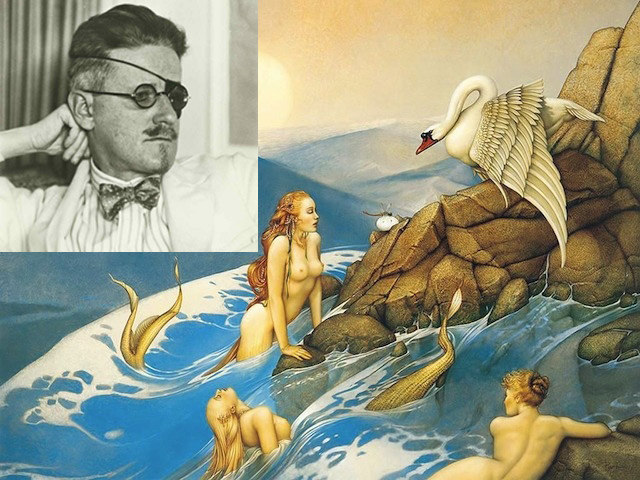
“Ho hum, I profess an interest in these cavorting sea nymphs only inasmuch as I can use them to allegorically comment on the Human Condition.”
Blake has stated, over at Vice, that he doesn’t want to read any more books about straight white people having sex. Stephen has stated, right here, that he is prepared to read many more novels about people fucking. There are substantial differences in these claims that we could pause to examine (“don’t want to read” vs. “am prepared to read”; “straight white people” vs. “people”; “sex” vs. “fucking”), but forgive me if I let those subtleties drop. Because I would rather observe that, if this is the scope of the debate, then it’s akin to one person saying, “I am tired of books about dogs, and no longer want to read more novels about them,” to which someone else replies, “I’m still willing to read some canine fiction.”
Recast in that light, it’s easy to see that neither person is right or wrong. How could they be? It is simply a matter of taste. One man has gotten tired of all those dog books. The other man is not yet so tired. The literary market, no doubt, will cater to them both. And perhaps, over time, demand for dog-free writing will grow, and drown out the pro-dog side, and the market will shift and, for some time, it will be hard to come by a copy of Marley and Me. (Here it might be helpful to replace “dogs” with some other thing, like vampires, or zombies, or alt-lit.) But through it all, one’s preference is perfectly free to steadfastly remain one’s preference. What’s not at stake, in other words, is the right to like whatever you like. The books you read say something about the person you are, and you should be proud of whoever you are! Display your chosen book(s) on the train to signal your affiliation with one of this nation’s many vibrant subcultures. Who knows? Another member of that subculture may spot you, in which case you can exchange nods, smiles, kisses! What’s more, today, thanks to the Internet, you can even make a list of the books that you like, then talk with fellow fans! (There are even web-sites devoted to this!)
Let’s try thinking instead about this argument in terms of genre. A new cowboy movie has comes out, and you and all of your friends go see it. Afterward, you’re wondering whether it’s any good or not …
I Am Prepared to Read Many More Novels About People Fucking
I haven’t read Sheila Heti or Ben Lerner’s recent novels, the impetuses for Blake Butler’s recent, anti-realism-themed Vice article, but I’d like to respond to Blake’s finely-written itemized essay, because I, personally, continue to desire novels written by humans, which relate, slipperily or not, to human reality—subjective, strange and ephemeral as it is–novels which deal with such humdrums as sex, boredom, relationships, Gchat, longing, and, beneath all, death. I want a morbid realism.
I agree with Blake that a reality show like The Hills and social media such as Facebook create stories by virtue of humans doing simply anything. The documenting, sharing, and promoting of mundane everyday human life is more prevalent and relentless than ever before. In this environment, literature (and movies) about humans (most controversially, about privileged, white, hetero humans) that presents everyday drank-beers-at-my-friend’s-apartment life, wallows in self-pitying romantic angst, and doggy paddles po-faced through mighty rivers of deeply profound ennui can potentially seem annoying, or boring, or shittastical.
Great First Lines: “Rose Alley” by Jeremy M. Davies
They shot her screen test in Paris, where I’ve never been, in the private room of the café Tout Va Bien, in the Latin Quarter, newly paved in tar, and still lewd that winter with debris from the blockades of stacked cobblestones—centuries old, pried right off the streets—and the stink of some secret catastrophe.
A disclaimer: Jeremy’s a dear friend and former roommate of mine—but c’mon! That opening line is obviously great. & the whole book is simply fabulous. I was motivated to post this because I just recommended, for the dozenth time, no joke, that a fellow writing classmate read the book …
So what’s going on in this opening line?

